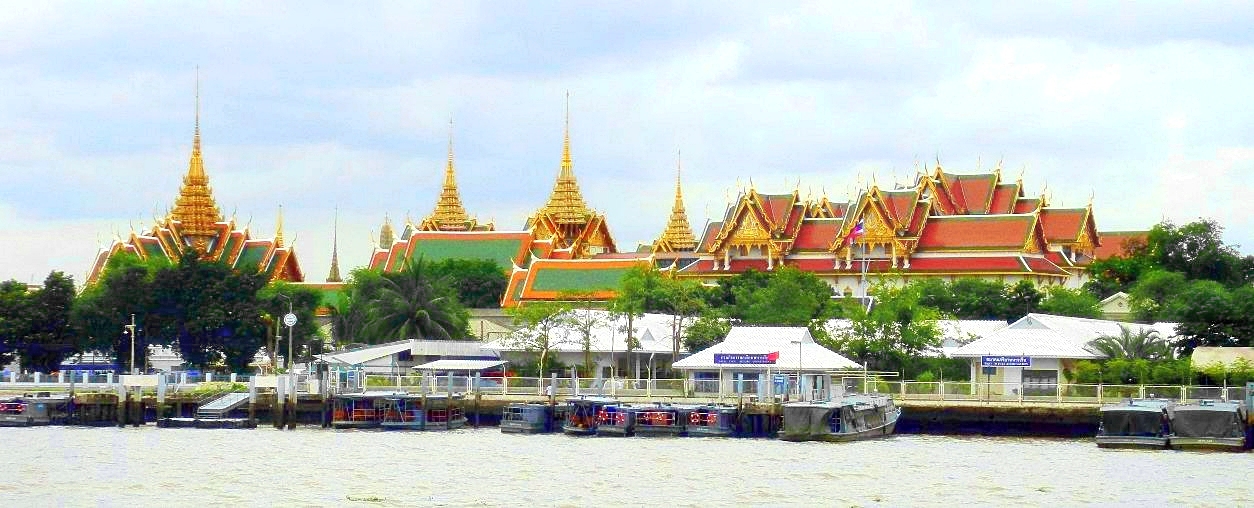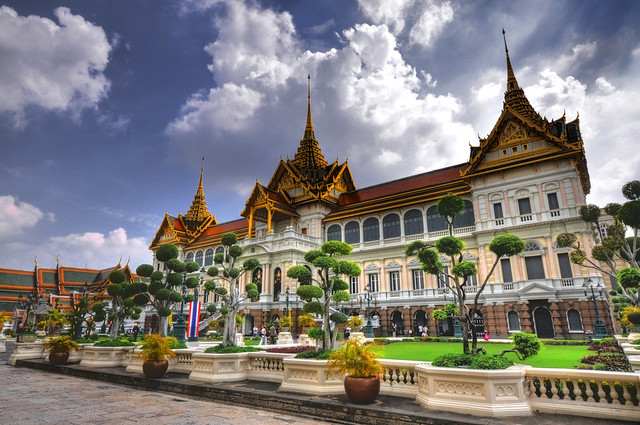
View of Grand Palace from the Chao Phraya River
The Grand Palace (Thai: พระบรมมหาราชวัง, Phra Borom Maha Ratcha Wang, lit. The Lord's Supreme, Great, Royal Palace) is a complex of buildings in Bangkok, Thailand. It served as the official residence of the Kings of Thailand from the 18th century onwards. Construction of the Palace began in 1782, during the reign of King Rama I, when he moved the capital across the river from Thonburi to Bangkok. The Palace has been constantly expanded and many additional structures were added over time. The present King of Thailand, King Bhumibol Adulyadej, however, resides at the Chitralada Palace.
Grand Palace Chakri Mahaprasad Hall front view
History
When King Buddha Yodfa Chulaloke (Rama I) decided to move the capital of Siam from Thonburi on the west to Bangkok on the east of the Chao Phraya River he decided to build a magnificent new palace as a place of residence as well as a centre of government. The area chosen was however occupied by Chinese merchants, whom he promptly asked to relocate (to the present day Yaowarat area).

Chakri Mahaprasat Hall
The tower of gold began construction on 6 May 1782. At first the palace consisted of several wooden buildings surrounded on four sides with a high defensive wall of 1,900 metres in length, which encloses an area of 218,400 square metres. Soon the King ordered the building of the Temple of the Emerald Buddha; as the Monarch’s personal place of worship and royal temple. Once the palace was complete the King decided to undergo a coronation ceremony to celebrate in 1785.

Prasat Phra Thap Bidon
The tower of gold began construction on 6 May 1782. At first the palace consisted of several wooden buildings surrounded on four sides with a high defensive wall of 1,900 metres in length, which encloses an area of 218,400 square metres. Soon the King ordered the building of the Temple of the Emerald Buddha; as the Monarch’s personal place of worship and royal temple. Once the palace was complete the King decided to undergo a coronation ceremony to celebrate in 1785.
Phra Si Rattana Chedi
The plan of the Grand Palace followed closely that of the old palace in Ayutthaya. The Palace is rectangular shaped, with the western side next to a river and the royal temple situated to the east side, with all structures facing north. The palace itself is divided into three quarters: the outer quarters, the middle quarters and the inner quarters.

A mythological giant
The palace became the centre of the Rattanakosin government and royal court for most of the early Chakri Dynasty until the reign of King Chulalongkorn (Rama V) who preferred to stay at the Dusit Palace, but still used the Grand Palace as an office and primary place of residence. This practice was followed by his sons (Rama VI and Rama VII) who preferred their own palaces.

King Ananda Mahidol (Rama VIII) moved into the palace full time after his return from abroad in 1945. However after his mysterious death a year later in one of the palaces inside the complex, his brother King Bhumibol Adulyadej (Rama IX) who succeeded him decided to move permanently to the Chitralada Palace.

One set of the 8 Double Sema Stones (Bai Sema)
The Palace is however still very much in use; as many royal rituals are performed here by the King every year. Other royal ceremonies celebrated here are coronations; royal funerals, marriages and state banquets. The Palace grounds also contain the offices and buildings of the Bureau of the Royal Household, the Office of the Private Secretary to the King and Royal Institute of Thailand.

Kinnon - mythological creature, half bird, half man






 06:30
06:30
 homesweethome
homesweethome

 Posted in:
Posted in: 









0 意見:
Post a Comment